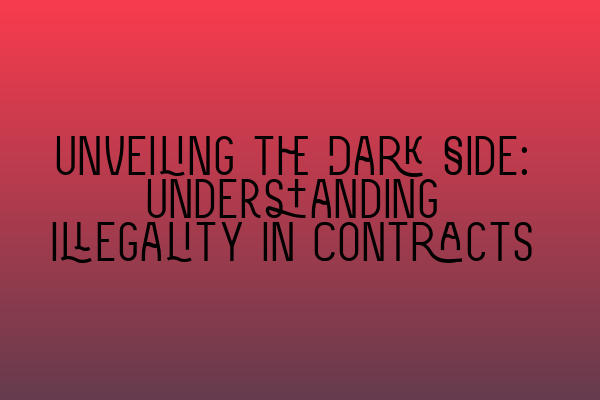Unveiling the Dark Side: Understanding Illegality in Contracts
Contracts are the cornerstone of legal relationships. They serve as binding agreements that define the rights and obligations of the parties involved. However, not all contracts are created equal. There is a dark side to contracts that is often overlooked – illegality.
Illegality in contracts refers to agreements that involve unlawful activities or are contrary to public policy. These contracts are considered void and unenforceable by the courts. It is crucial for solicitors and legal professionals to have a deep understanding of illegality to protect their clients and ensure the integrity of the legal system.
The Elements of Illegality
To understand illegality in contracts, we need to explore its fundamental elements:
- Illegal Acts: The contract must involve an illegal act, including criminal offenses, fraudulent activities, or acts that contravene statutes or regulations.
- Legal Restraint: The contract may be deemed illegal if it imposes a legal restraint on the parties involved. Examples include agreements that restrict trade, limit personal freedom, or promote illegal activities.
- Contravention of Public Policy: Contracts that are contrary to public policy are considered illegal. Such contracts go against established societal norms and undermine the public interest.
It is essential to identify these elements and assess the legality of a contract before advising clients or proceeding with legal actions.
Types of Illegal Contracts
Illegal contracts can take various forms, each with its own implications and consequences. Here are some common types:
- Contracts in Restraint of Trade: These contracts restrict individuals from engaging in lawful trade or employment. They may include non-compete agreements, which limit a person’s ability to work in a specific industry or geographical area.
- Contracts for Illegal Goods or Services: Contracts involving the sale or provision of illegal goods or services are illegal and unenforceable. This includes contracts related to drugs, counterfeit products, or illegal gambling activities.
- Contracts Contrary to Public Policy: Certain agreements that violate public policy, such as those promoting discrimination, corruption, or environmental harm, are considered illegal and against public interest.
- Fraudulent Contracts: Contracts based on fraudulent misrepresentation, concealment of facts, or duress are not only unethical but also illegal. These contracts are inherently void and cannot be enforced.
Understanding these types of illegal contracts is crucial for solicitors to protect their clients from potential legal consequences and uphold the principles of justice.
The Consequences of Illegality
When a contract is deemed illegal, it is considered void ab initio, meaning it is treated as though it never existed. The consequences of illegality can be severe and far-reaching:
- Unenforceability: Illegal contracts cannot be enforced by the court. This means that parties cannot seek remedies for breaches or claim damages under such agreements.
- Loss of Rights: Illegality may lead to the loss of certain rights or protections that would have been available under a legal contract. This can leave parties vulnerable to potential harm or exploitation.
- Repayment Obligations: If a contract involves an illegal transaction, any money or assets transferred under that contract may need to be repaid, even if it has been spent or consumed.
- Legal Consequences: Engaging in illegal contracts can lead to legal repercussions, including fines, penalties, and even criminal charges, depending on the nature of the illegal activity involved.
It is essential for solicitors to advise their clients against entering into illegal contracts and to guide them through legal alternatives to address their needs.
Conclusion
Illegality in contracts is a critical aspect of contract law that solicitors must navigate carefully. By understanding the elements of illegality, recognizing different types of illegal contracts, and being aware of the consequences, solicitors can protect their clients’ interests and ensure the legitimacy and integrity of contractual relationships.
For more information on related legal topics, be sure to check out our other articles:
- Mentorship for Aspiring Solicitors: Nurturing Talent in the Legal Field
- Mentorship for Aspiring Solicitors: Finding Guidance on Your Legal Journey
- Exploring Alternative Dispute Resolution: An Effective Approach to Legal Conflicts
- The Art of Contract Drafting and Negotiation: Skills Every Solicitor Should Master
- Navigating the Legal Practice Course (LPC): Your Path to Solicitor Qualification
